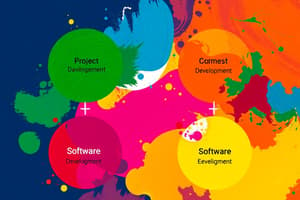Podcast
Questions and Answers
What is the feedback mechanism introduced in the Iterative waterfall model?
What is the feedback mechanism introduced in the Iterative waterfall model?
- Feedback paths for defect correction (correct)
- Feedback for continuous improvement
- No feedback mechanism
- Feedback for faster development
Why is the classical waterfall model considered to be idealistic?
Why is the classical waterfall model considered to be idealistic?
- Assumes no defect is introduced during any development activity (correct)
- Supports continuous improvement
- Detects and fixes defects in the same phase
- Has a realistic feedback mechanism
In the Iterative waterfall model, what happens if a defect is noticed during the testing phase?
In the Iterative waterfall model, what happens if a defect is noticed during the testing phase?
- Document the defect for future reference
- Go back to the design or requirement analysis phase to fix the defect (correct)
- Wait for the next phase to fix the defect
- Ignore the defect and continue with testing
What is the main difference between the classical waterfall model and the Iterative waterfall model?
What is the main difference between the classical waterfall model and the Iterative waterfall model?
Why does the Iterative waterfall model emphasize detecting and fixing defects in the same phase?
Why does the Iterative waterfall model emphasize detecting and fixing defects in the same phase?
Flashcards are hidden until you start studying
Study Notes
Feedback Mechanism in Iterative Waterfall Model
- The feedback mechanism in the Iterative waterfall model allows for feedback from any phase to its previous phase.
Limitations of Classical Waterfall Model
- The classical waterfall model is considered idealistic because it assumes that requirements can be fully gathered at the beginning of a project and remain static throughout.
Defect Handling in Iterative Waterfall Model
- If a defect is noticed during the testing phase in the Iterative waterfall model, it is sent back to the previous phase for correction, and the process is repeated until the defect is resolved.
Comparison of Classical and Iterative Waterfall Models
- The main difference between the classical waterfall model and the Iterative waterfall model is that the latter allows for feedback and iteration between phases.
Emphasis on Defect Detection and Fixing
- The Iterative waterfall model emphasizes detecting and fixing defects in the same phase to prevent errors from being propagated to later phases.
Studying That Suits You
Use AI to generate personalized quizzes and flashcards to suit your learning preferences.




